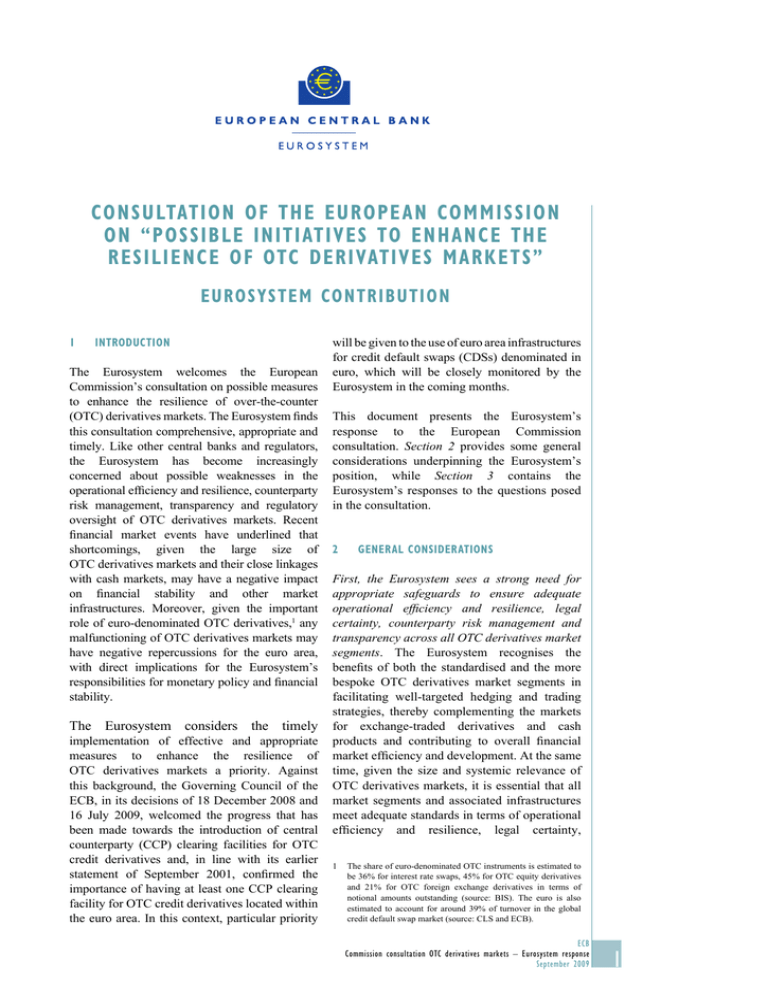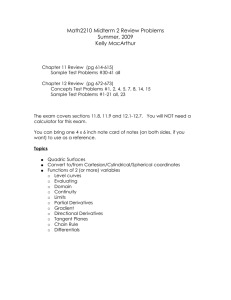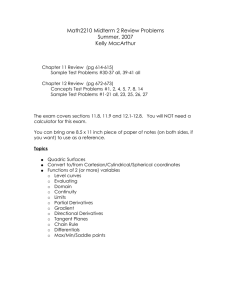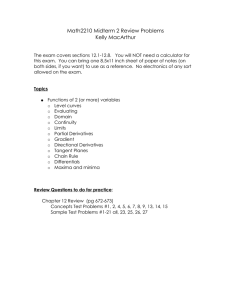
CONSULTATION OF THE EUROPEAN COMMISSION
ON “POSSIBLE INITIATIVES TO ENHANCE THE
RESILIENCE OF OTC DERIVATIVES MARKETS”
EUROSYSTEM CONTRIBUTION
1
INTRODUCTION
The Eurosystem welcomes the European
Commission’s consultation on possible measures
to enhance the resilience of over-the-counter
(OTC) derivatives markets. The Eurosystem finds
this consultation comprehensive, appropriate and
timely. Like other central banks and regulators,
the Eurosystem has become increasingly
concerned about possible weaknesses in the
operational efficiency and resilience, counterparty
risk management, transparency and regulatory
oversight of OTC derivatives markets. Recent
financial market events have underlined that
shortcomings, given the large size of
OTC derivatives markets and their close linkages
with cash markets, may have a negative impact
on financial stability and other market
infrastructures. Moreover, given the important
role of euro-denominated OTC derivatives,1 any
malfunctioning of OTC derivatives markets may
have negative repercussions for the euro area,
with direct implications for the Eurosystem’s
responsibilities for monetary policy and financial
stability.
The Eurosystem considers the timely
implementation of effective and appropriate
measures to enhance the resilience of
OTC derivatives markets a priority. Against
this background, the Governing Council of the
ECB, in its decisions of 18 December 2008 and
16 July 2009, welcomed the progress that has
been made towards the introduction of central
counterparty (CCP) clearing facilities for OTC
credit derivatives and, in line with its earlier
statement of September 2001, confirmed the
importance of having at least one CCP clearing
facility for OTC credit derivatives located within
the euro area. In this context, particular priority
will be given to the use of euro area infrastructures
for credit default swaps (CDSs) denominated in
euro, which will be closely monitored by the
Eurosystem in the coming months.
This document presents the Eurosystem’s
response to the European Commission
consultation. Section 2 provides some general
considerations underpinning the Eurosystem’s
position, while Section 3 contains the
Eurosystem’s responses to the questions posed
in the consultation.
2
GENERAL CONSIDERATIONS
First, the Eurosystem sees a strong need for
appropriate safeguards to ensure adequate
operational efficiency and resilience, legal
certainty, counterparty risk management and
transparency across all OTC derivatives market
segments. The Eurosystem recognises the
benefits of both the standardised and the more
bespoke OTC derivatives market segments in
facilitating well-targeted hedging and trading
strategies, thereby complementing the markets
for exchange-traded derivatives and cash
products and contributing to overall financial
market efficiency and development. At the same
time, given the size and systemic relevance of
OTC derivatives markets, it is essential that all
market segments and associated infrastructures
meet adequate standards in terms of operational
efficiency and resilience, legal certainty,
1
The share of euro-denominated OTC instruments is estimated to
be 36% for interest rate swaps, 45% for OTC equity derivatives
and 21% for OTC foreign exchange derivatives in terms of
notional amounts outstanding (source: BIS). The euro is also
estimated to account for around 39% of turnover in the global
credit default swap market (source: CLS and ECB).
ECB
Commission consultation OTC derivatives markets – Eurosystem response
September 2009
1
counterparty risk management, transparency
vis-à-vis the markets and competent public
authorities, and regulatory oversight.
Second, the Eurosystem would like to emphasise
the significance of the recently adopted
ESCB-CESR recommendations for CCPs as a
major contribution to promoting the soundness
of centrally cleared derivatives transactions.
One of the remaining challenges is now to
ensure the consistent implementation of these
recommendations across all EU jurisdictions
in order to create the conditions for a true
regulatory level playing field in the European
clearing landscape. Given the non-binding
nature of the ESCB-CESR recommendations,
their consistent application will greatly depend
on each authority’s goodwill in applying
the recommendations and cooperating with
one another for the sake of establishing
a harmonised regulatory and oversight
environment in Europe. If the implementation
process to be conducted in the coming months
reveals that a consistent application of the
recommendations is not feasible on the basis
of the existing EU legislation and non-binding
recommendations, the Eurosystem considers
that further measures might be an option.
Third, as pointed out in the ESCB-CESR
recommendations, there are some important
aspects which are relevant from a systemic
and financial stability point of view but which
could not be addressed either in the existing
recommendations or by CCPs. These issues
include the growing complexity of market
infrastructures in general, interdependencies
between payment, clearing and settlement
systems, the protection of indirect clearing
members, and the role of data repositories.
These aspects (all of which are also of relevance
for the Commission’s future work) should and
will be followed up at both the European and
the global level in a coordinated manner.
Fourth, the global nature of OTC derivatives
markets highlights the importance of global
2
ECB
Commission consultation OTC derivatives markets – Eurosystem response
September 2009
cooperation and data-sharing among all
stakeholders. A global cooperative framework
has already been established through the
CDS CCP Regulators’ Forum, which aims to
facilitate information-sharing and cooperation
among financial regulators with respect to
the CDS CCPs and the Trade Information
Warehouse, as well as with other interested
financial regulators. Moreover, cooperation will
also be established within the new framework
for macro- and micro-prudential supervision,
in particular through the European Systemic
Risk Board. Furthermore, the duplication of
international regulatory efforts by European
initiatives should be avoided as far as possible,
not least in order to preclude the emergence of
inconsistent or even conflicting requirements.
In particular, the Eurosystem considers that
EU regulatory initiatives should take due
account of the ESCB-CESR recommendations
as adopted and of the ongoing revision of the
CPSS-IOSCO recommendations for CCPs,
which will also consider possible issues relating
to other infrastructures and service providers
in OTC derivatives markets, such as data
repositories, and will address several issues
raised in the Commission’s Communication.
In this context, the Working Group on credit
risk transfer statistics reviewed the current
semi-annual BIS statistics on CDSs and proposed
some enhancements to the statistical information
available on risk transfer mechanisms. The
recommendations, in particular those on CDS
statistics, were approved by the Working
Group’s parent body, the Committee on the
Global Financial System, in June 2009 (see the
response to question 23 for more details). They
are publicly available.
Finally, the responses to the questions contained
in the consultation document in principle
address all OTC markets and do not refer to
any particular segment of the OTC markets. As
a consequence, specific issues concerning only
some markets, which are nevertheless important,
are not addressed here.
3
RESPONSES TO THE INDIVIDUAL QUESTIONS
3.1
PROMOTING FURTHER STANDARDISATION
(1)
What would be a valid reason not to use
electronic means as a tool for contracts
standardisation?
The Eurosystem considers the promotion and
enhancement of contract standardisation as an
important way of facilitating the use of CCP
clearing, thus allowing for better risk management.
In view of the benefits that electronic trading
and greater contract standardisation may offer,
market participants could be invited to explain
why, in their view, the use of electronic means
and further contract standardisation may not be
possible in certain cases.
(2)
Should
contracts
standardisation
be measured by the level of process
automation? What other indicators can
be used?
Advances in standardisation and automation
typically evolve in parallel. Thus, greater
standardisation is often associated with
more automation. However, there are other
indicators of standardisation. For example,
higher trading volumes and the absence of
significant (economic and legal) differences in
contract terms can also be viewed as indicators
of standardisation. Moreover, if a derivatives
contract is accepted by one or more CCPs, this
can be seen as an indication that it is sufficiently
standardised. However, the decision by one CCP
to clear a certain type of derivatives contract
should not make it compulsory for other CCPs
to accept such derivatives contracts as well.
(3)
Should non-standardised contracts face
higher capital charges for operational
risk?
By facilitating the automated processing of
trades, contract standardisation is often a
prerequisite for the clearing of such trades by a
CCP and thus offers significant benefits in terms
of operational risk management and efficiency.
From the Eurosystem’s point of view, priority
should be given to counterparty risk mitigation
tools and in particular CCP clearing. However,
positive incentives in favour of CCP clearing
already exist. Moreover, general operational
risk capital requirements have already been
incorporated into the Capital Requirements
Directive (CRD); a recognition of strengthened
requirements for non-standardised contracts
seems technically difficult in this area.
(4)
What
other
incentives
toward
standardisation could be used, especially
for non-credit institutions?
Customised and non-standardised products
can be beneficial, in particular for the risk
management and hedging purposes of
non-credit institutions. As a result, the
Eurosystem acknowledges that there is demand
and scope for such non-standardised products.
Furthermore, the Eurosystem would expect
that any additional risks that are specifically
associated with such non-standardised products
will be effectively addressed on the basis
of monitoring, auditing and rigorous risk
management efforts that may well have to go
beyond those applied to standardised products.
3.2
STRENGTHENING BILATERAL COLLATERAL
MANAGEMENT FOR NON-CCP ELIGIBLE
OTC DERIVATIVES
(5)
How could the coverage of collateralised
credit exposures be improved?
From a financial stability perspective, the
effective collateralisation of all credit exposures
is highly important. Achieving this objective is
generally more challenging in those cases where
credit exposures are managed on a bilateral
basis rather than by a CCP, given the absence
of harmonised procedures and the more limited
opportunities for collateral savings through
multilateral netting. Multilateral netting via CCP
clearing reduces net exposures, thus limiting the
amount of collateral required and facilitating a
higher degree of collateralisation. Additional
challenges may arise in those cases where
derivatives transactions involve non-financial
institutions that do not hold substantial amounts
of collateral.
ECB
Commission consultation OTC derivatives markets – Eurosystem response
September 2009
3
Against this background, the Eurosystem
would suggest the following course of action.
First, it is important to achieve a higher level
of transparency in collateralisation practices.
To do so, regulators may need more detailed
and comprehensive information regarding
the types of counterparty that are involved in
non-collateralised transactions. Second, it
would seem useful to assess, in cooperation
with the financial industry, possible ways to
further harmonise procedures for the calculation
of bilateral exposures. Third, it is important
to ensure the continuous monitoring of such
exposures. Fourth, exposures and associated
risks will then have to be addressed on the basis
of sufficient collateral or capital. In this context,
to the extent that the overall CRD framework
allows, regulators may wish to review the CRD
treatment of the counterparty risk of bilaterally
cleared OTC derivatives exposures in terms
of compliance with best practices. Finally, to
ensure the smooth availability of collateral, it
would also seem beneficial to assess the scope
for, and possible obstacles to, an enhanced use of
non-cash collateral for OTC derivatives
exposures. In this regard, it should be noted
that central clearing and multilateral netting are
conducive to a higher degree of collateralisation.
(7)
(6)
Before any regulatory or legislative measures
are adopted, the Eurosystem would propose, as
a first step, that collateralisation is reviewed –
reliable sources of aggregate information are
scarce at present – and the expected progress
in collateralisation resulting from the increased
risk awareness in the derivatives industry
is monitored. As a second step, if sufficient
collateralisation and other risk mitigation
controls do not evolve spontaneously within
a reasonably short period of time appropriate
further measures might be an option
to this end.
Are there markets where daily
valuation, exchange of collateral and
portfolio reconciliation cannot be the
goal? Please justify.
In the course of its work on CCPs and the
infrastructure for OTC derivatives, the
Eurosystem has not become aware of any
markets where daily valuation, exchange of
collateral and portfolio reconciliation might not
be a goal, but acknowledges that participants in
such markets might be better placed to provide
examples that prove the contrary.
In addition to regular portfolio reconciliation,
the Eurosystem supports regular portfolio
compression for OTC derivatives, which is
still a relatively new practice. The Eurosystem
expects that its usage by a broad range of market
participants will increase as the industry gains
greater experience in this regard.
4
ECB
Commission consultation OTC derivatives markets – Eurosystem response
September 2009
How frequently should multilateral
netting be used?
In view of the benefits of multilateral netting,
the Eurosystem expects that it is in the interest
of the industry to ensure that multilateral netting
takes place sufficiently frequently and regularly,
in a legally sound environment.
(8)
Should bilateral collateral management
be left to self-regulatory initiatives
or does it need to be incentivised by
appropriate legislative instruments?
In view of the considerable systemic risks
inherent in non-CCP-cleared derivatives
transactions, the Eurosystem considers that
effective risk controls including collateral
and capital are indispensable. Appropriate
collateralisation and other risk controls will
also contribute to providing the necessary
incentives for participants to move their bilateral
transactions into central clearing. The degree of
risk mitigation that market participants have
adopted voluntarily in the past was not sufficient.
The Eurosystem acknowledges, however, that
there is now greater awareness of the risks and
the need for risk controls, which may lead the
industry to increase the level of collateralisation
spontaneously.
For interdealer activity, the assessment
of the required level of collateral could
be based on the criteria applied by CCPs,
which could be considered as a benchmark.
This issue would also merit international
harmonisation.
3.3
CENTRAL DATA REPOSITORIES
(9)
Are there market segments for which a
central data repository is not necessary
or desirable?
The Eurosystem regards central data
repositories as an essential tool for enhancing
operational procedures and transparency in
financial markets, especially with regard to
OTC derivatives markets and, where relevant,
the underlying instruments. In particular,
to the extent that data repositories achieve
comprehensive coverage of certain products,
they can provide regulatory and supervisory
authorities and the markets with a timely
overview of the build-up and distribution of
exposures in the relevant markets. In this way,
central data repositories can also play a role
as the providers of the information necessary
to enable relevant authorities to establish
an early-warning mechanism for emerging
financial risks.
The Eurosystem would like to underline that
the functions currently performed by existing
data repositories could also be performed by
other private or public entities. The Eurosystem
would therefore propose adopting a functional
approach for issues relating to data repositories,
focusing on the sound provision of the service
rather than on the nature of the provider. The
widespread use of central repositories or similar
functions for OTC derivatives is of utmost
interest to regulators and market participants.
Such a repository currently exists only for credit
derivatives, run by DTCC in the United States.
In the long run, European market participants
may favour the possibility of establishing
a European central data repository for
euro-denominated transactions.
Against this background, the Eurosystem
strongly supports the extended use of central
data repositories for all OTC derivatives asset
classes, including both standardised and nonstandardised products. It is not aware of any
market segment for which repositories or
similar functions would not be desirable or
necessary.
(10) Which regulatory requirements should
central data repositories be subject to?
A wider use of central data repositories would
imply an increased reliance of users, public
authorities, interoperable infrastructures and
service providers on the availability, timeliness
and accuracy of the data in such a repository.
This highlights the need for regulatory oversight
of central data repositories and other entities
performing similar functions.
The Eurosystem would like to point out that
the ESCB-CESR recommendations for CCPs
already identify a range of requirements that
data repositories and other entities performing
similar functions should comply with, including
transparency, reporting to competent authorities,
legal soundness, governance, operational
resilience and – where they are not an integral
part of the CCP – fair access criteria. To this
end, a cooperative oversight framework needs to
be developed at the global level for warehouses
that serve multiple markets, which, in addition
to ensuring that the authorities are part of the
cooperative oversight framework, should also
give the relevant authorities uninhibited access
to information held by trade warehouses.
Against this background, the Eurosystem
welcomes the intention of the CPSS and IOSCO
to review their 2004 recommendations for CCPs
and to consider in this context also possible
recommendations specifically for functions
relating to central data warehousing. The results
of this work are expected to provide clarity
on regulators’ expectations in this area and to
establish the basis for a global regulatory level
playing field. The Eurosystem also welcomes
the efforts of the OTC derivatives Regulators’
Forum to establish a regulatory framework for
DTCC’s Trade Information Warehouse.
(11) What information should be disclosed
to the public?
Information items collected by data repositories
that may be eligible for public reporting could
include in particular live positions, activity
for the data repository’s positions, transaction
activity, and aggregate open interest and
ECB
Commission consultation OTC derivatives markets – Eurosystem response
September 2009
5
settlement data by currency denomination,
provided that no inference can be drawn
about individual participants’ positions. The
Regulators’ Forum is currently in the process
of identifying the uniform set of quantitative
and qualitative regulatory information to be
requested from data repositories.
Moreover, ESCB-CESR recommendation 14
requires CCPs to complete and disclose the
answers to the key questions of the ESCB-CESR
recommendations (as does CPSS-IOSCO
recommendation 14). This requirement
could be extended to entities performing
data warehousing functions. The Eurosystem
considers that the answers to these key questions
are essential to provide market participants
and the general public with the complete and
accurate information that they need.
Finally, the Eurosystem would encourage
the use of information on OTC derivatives
transactions and positions, including data
derived from central data repositories, also for
statistical purposes, as these repositories could
provide a vital information basis with which
to measure bilateral and sectoral exposures in
specific instruments and markets, subject to the
strict confidentiality criteria that apply. For this
purpose, the Eurosystem would encourage a high
degree of standardisation in the classification of
instruments and sectors, with the latter being
based on unique identifiers for entities acting as
counterparties in the respective markets.
3.4
MOVE CLEARING OF STANDARDISED
OTC DERIVATIVES TO CCPs
3.4.1 DEFINING CCP ELIGIBLE CONTRACTS
(12) Do you agree that the eligibility of
contracts should be left to CCPs?
Which governance arrangements might
be necessary for this decision to be left
to the CCPs’ risk committees?
The Eurosystem agrees with the European
Commission on promoting the CCP clearing of
OTC derivatives to the greatest possible extent,
given the pronounced benefits in terms of the
6
ECB
Commission consultation OTC derivatives markets – Eurosystem response
September 2009
reduction of counterparty risk and operational
risk management and efficiency as compared
with bilateral clearing. With regard to the
definition of eligible contracts, the Eurosystem
considers that the decision should primarily
be left to the CCPs themselves (subject to
the applicable regulatory framework), given
that they would be the ultimate holders of the
resulting risks and taking into account ongoing
product innovation.
Moreover, precautions should be taken to
avoid the possibility that this decision may be
impacted by conflicts of interest at the CCP,
especially in view of the oligopolistic nature
of OTC derivatives markets and/or the owner/
shareholder structure of CCPs that can influence
the CCP’s decision in terms of eligibility criteria.
At a minimum, CCPs should be required to be
completely transparent about their decisions and
the reasoning behind them.
Further guidance on this matter is expected to be
provided by the CPSS-IOSCO working group
revising the CPSS-IOSCO recommendations
for CCPs, as it will consider both the eligibility
criteria for contracts and the adequate
consultation mechanisms of CCPs.
3.4.2 INCENTIVES TO USE CCP CLEARING
(13) What additional benefits should the
CCP provide to secure a broader use of
its services?
Central clearing facilitates risk management,
enables multilateral netting, helps to save
liquidity, sustains anonymity, and improves
operational efficiency. In order to effectively
address the specific risks associated with the
clearing of OTC derivatives, CCPs must apply
adequate risk control measures. The adaptation
of the ESCB-CESR recommendations for
CCPs to reflect the specific risks associated
with the clearing of OTC derivatives has been a
milestone in this respect.
CCP services, and in particular the management
and reduction of risks, involve costs in terms
of fees and the provision of margins and other
forms of collateral in order to be compliant with
the ESCB-CESR recommendations. If CCPs are
not used broadly enough, it may be the result of
insufficient regulatory incentives and the fact
that bilateral clearing is currently not subject to
sufficiently rigorous risk controls, which may
result in bilateral clearing being less costly for
participants than central clearing.
ESCB-CESR recommendation 14 for CCPs
reflects the need for segregation by specifying
that “a CCP may be in a position to contribute
to asset segregation by providing separated
accounts and margining (and collateral). In this
case, the CCP should clearly describe the level
of segregation it can offer and the consequences
thereof (e.g. the approach to margining).”
(14) Is the zero-risk weighting a sufficiently
effective incentive for using CCPs across
different market segments?
The Eurosystem considers that zero-risk
weighting capital treatment for centrally cleared
derivatives exposures is a powerful incentive
for using CCPs. The zero-risk weighting capital
treatment of centrally cleared transactions needs
to be complemented, however, by adequate risk
controls for transactions that are not centrally
cleared (collateralisation and/or additional
capital requirements).
(16) Should bilateral clearing of CCPeligible CDS be penalised and, if so, to
what extent? Is there a need to extend
regulatory incentives to clear through a
CCP to other derivatives products?
As noted above, the Eurosystem takes the view
that bilaterally cleared derivatives transactions
need to be subject to adequate risk controls
involving collateralisation and/or capital
requirements. If there is no voluntary adoption
of collateralisation practices and other risk
controls within a reasonably short period of
time, the Eurosystem would support further
measures to ensure effective risk management
in the bilateral derivatives trading environment,
which may also take the form of additional
capital incentives/penalties for CCP-eligible
derivatives products that are not cleared through
a CCP. Alternatively, positive incentives in
favour of CCP clearing could be strengthened.
The Eurosystem does not see any valid reason
to limit the use of central clearing to any
particular class of products. Furthermore, taking
into account the fact that resistance to the use
of clearing services may be related to costs, it
supports transparency on margin requirements
and clearing fees.
(15) Should additional requirements, such
as appropriate account segregation,
be introduced to apply the zero-risk
weighting to indirect participants?
The Eurosystem strongly agrees that there is
a need for an effective segregation of clients’
assets by CCP clearing members, and considers
that the benefits of this measure would extend
beyond broadening the access to capital relief
to include indirect clearing members. Such
segregation should be supported by appropriate
legal protection, and a review of the existing
legal frameworks in the EU in this respect
may be warranted. Indeed, the importance
of appropriate account segregation by CCPs
was underscored during the financial market
turbulence; it has gained further importance in
view of the fact that interoperability between
different CCPs is unlikely to be achieved
in the near future and that indirect access
to different CCPs via the respective general
clearing members is therefore expected to
provide the main interim solution for enabling
the central clearing of the exposures of trading
partners that are direct clearing members at
different CCPs.
(17) Under
which
conditions
should
exemptions be granted and by whom?
Currently, there does not seem to be a need to
grant exemptions since both bilaterally and
multilaterally cleared transactions are subject
to regulation (see answer to question 16 above),
although with different treatments and incentives
according to the different risk profiles. However,
if further actions were to be considered, the need
for discussions about exemptions might arise
(e.g. concerning contracts that are not eligible
ECB
Commission consultation OTC derivatives markets – Eurosystem response
September 2009
7
for CCP clearing; parties effecting trades that
are unable to have access to a CCP and/ use
a clearing member; or where the size of the
eligible contracts is limited and the parties are
able to prove to their supervisors that the related
risks are properly managed).
(18) What is the minimum acceptable ratio
of CCP cleared/eligible contract? What
is the maximum acceptable number of
non-eligible contracts?
As noted above, the Eurosystem considers that
as many derivatives trades as possible should
be moved into central clearing, while all trades
that remain in a bilateral environment should
be subject to other forms of rigorous risk
control. From this perspective, any quantitative
determination in terms of ratios, numbers, etc.
appears irrelevant.
(19) What statistics need to be provided to
regulators to make sure they have all
the information necessary to perform
their duties?
The CCP Regulators’ Forum, where regulators
come together to exchange views and share
information on CDS CCP developments, is in
the process of developing uniform quantitative
and qualitative regulatory information requests
for CDS CCPs and the Trade Information
Warehouse.
As regards the quantitative information that
regulators will request from CCPs, the forum
has identified the need to receive statistics on
particular live positions, activity for the data
repository’s positions, transaction activity, and
aggregate open interest and settlement data by
currency denomination, which is information
that could also be disclosed to the public. In
addition, regulators may need information on
participant type and residency, concentration
data, information on participants’ positions
and collateral and funding data. Subject to the
fulfilment of strict confidentiality requirements,
the information collected should also aim to
serve statistical requirements arising from
monetary analysis and financial stability. This
would considerably enrich the dataset available
8
ECB
Commission consultation OTC derivatives markets – Eurosystem response
September 2009
for these purposes, as well as avoiding a double
collection which would further increase the
reporting burden.
In addition to data from CCPs, information
transmitted by financial institutions could be
collected and monitored by regulators in order
to assess the evolution of clearing practices.
Regulators may need information on the share
of contracts eligible for central clearing, the
share of contracts cleared by instrument and
participant type.
3.4.3 ENSURING THE SAFETY AND SOUNDNESS
OF CCPs
(20) How could European legislation help
ensuring safety, soundness and a level
playing field between CCPs?
The Eurosystem welcomes the reference
to the importance of the ESCB-CESR
recommendations for CCPs, which were
published on 23 June 2009. As noted above,
the adoption of these recommendations implies
that, for the first time, a consistent set of
recommendations is available for EU authorities
to follow in conducting the regulation and
oversight of EU CCPs. At the same time,
given the envisaged global product scope of
several CDS CCP solutions put forward during
2009, global regulatory convergence is also
indispensable. In this context, the Eurosystem
supports the current review of the application
of the CPSS-IOSCO recommendations to CCPs
for OTC derivatives.
If the implementation of the respective
recommendations to be conducted in the coming
months reveals that a consistent application of
the recommendations is not feasible on the basis
of the existing EU legislation and non-binding
recommendations, the Eurosystem considers
that further measures should be envisaged.
Moreover, as ESCB-CESR recommendation 1
for CCPs points out, for systemic risk purposes,
the harmonisation of rules relevant for CCPs
should be promoted to minimise discrepancies
stemming from different national legal
frameworks. This will minimise the effects of
potential conflicts of law, thereby increasing
the level of legal certainty. In this respect, some
harmonisation has already been achieved through
the implementation of the Settlement Finality
Directive, the Financial Collateral Directive and
the Markets in Financial Instruments Directive
(MiFID), assuming that the revised Settlement
Finality and Financial Collateral Directives will
be fully implemented by EU Member States
in due course. Further harmonisation should
be considered at the EU level in the future, in
particular in terms of capital requirements.
3.5
INCREASE TRANSPARENCY OF PRICES,
TRANSACTIONS AND POSITIONS
3.5.1 TRANSPARENCY OF TRADING
(21) Should MiFID-type pre- and post-trade
transparency rules be extended to nonequities products? Are there other
means to ensure transparency?
The Eurosystem considers that enhanced
transparency in OTC derivatives markets is one
of the key conditions for reducing uncertainty,
facilitating effective market discipline and
supporting adequate regulatory oversight in
these markets. In this context, the Eurosystem
would like to highlight that the emerging market
infrastructures for OTC derivatives could play an
important role in enhancing market transparency,
as a complement to the possible extension of
prudential reporting requirements for financial
institutions trading OTC derivatives, which
will be further assessed, in particular during the
upcoming review of the MiFID.
The Eurosystem would welcome transparency
rules to tackle the unwanted effects that may
arise in a decentralised trading environment,
taking into account the different nature of the
products and the complexities of their pricing.
These effects can be particularly pronounced
in the OTC environment. However, the
Eurosystem would not support the extension
of the MiFID to other asset classes as an
appropriate tool to this end.
Finally, the Eurosystem would like to point
out that the ESCB-CESR recommendations for
CCPs contain a large number of transparency
requirements relating to many different areas.
While most of these requirements refer to
aspects other than trading, some of them have
a bearing on the transparency of prices. In
particular, CCPs are required to be transparent
about the way they obtain and/or calculate
prices that are needed as a basis for margin
calculations.
3.5.2 TRANSACTION AND POSITION REPORTING
OF OTC DERIVATIVES
(22) How should transaction reporting
of OTC derivatives to competent
authorities be envisaged? Should
it be extended to all contracts or to
certain categories? If so, which ones?
Are there other means to ensure that
the competent authorities receive
the relevant information on OTC
derivatives transactions?
(23) How should position reporting of
derivatives to competent authorities be
envisaged? Should it be extended to all
contracts or to certain categories? If so,
which ones? Are there other means to
ensure that the competent authorities
receive the relevant information on the
exposures to particular contracts?
In the case of centrally cleared transactions,
ESCB-CESR recommendation 15 for CCPs
requests CCPs to provide regulators and central
banks with information on many different
aspects necessary for regulation and oversight
in a timely manner. The recommendation also
requires the authorities to exchange relevant
information for the regulation and oversight
of CCPs. This could be extended to data
repositories. The details on the collection
and exchange of information by regulators
and overseers will be developed and refined
in the forthcoming implementation exercise.
The Eurosystem considers that such reporting
requirements and the way in which they are
ECB
Commission consultation OTC derivatives markets – Eurosystem response
September 2009
9
implemented could be extended to all types of
derivatives transaction, regardless of whether
or not they are traded on regulated markets.
Moreover, as noted above, an execution
framework to ensure the effective and
streamlined implementation of information
requirements is currently being developed by the
global Regulators’ Forum. Again, while these
requirements concern CCP-cleared transactions,
they could be consistently applied to all sorts of
derivatives transaction. Overall, the Eurosystem
expects that the work in this field will provide
a significant enhancement as regards the
transparency of OTC derivatives, not only
for direct regulators, but also for less directly
affected public authorities, as well as market
participants. In this context, the Eurosystem
would like to underline once more the benefits of
the wider use of central data repositories, given
their ability to capture also the less standardised
OTC derivatives markets.
As mentioned before, the Working Group on
credit risk transfer statistics drew up a number
of short and medium-term proposals to increase
the available information on risk transfer
mechanisms, focusing in particular on CDSs.
3.6
MOVE TRADING TO MORE PUBLIC VENUES
(24) How can further trade flow be
channelled through transparent and
efficient trading venues? What would
be the appropriate level of transparency
(price, transaction, position) for the
different derivatives markets?
Different types of trading mechanism can be
distinguished, including regulated markets,
multilateral trading facilities and internalising
intermediaries. Such public/multilateral trading
venues are mechanisms for executing trades
that allow multiple parties to accept bids or
offers from other participants. Trading in
public/multilateral venues requires a significant
degree of contract standardisation. In many
cases, counterparties to OTC derivatives trades
seek to customise the terms of trade to meet
very specific risk management needs, with the
10
ECB
Commission consultation OTC derivatives markets – Eurosystem response
September 2009
result that many OTC trades are not suitable for
trading in public/multilateral venues. However,
many OTC derivatives, including many
credit derivatives, have become sufficiently
standardised, such that not only central clearing
but also trading in public/multilateral venues
may be feasible and could be expanded through
the further standardisation of contracts while
still meeting risk management needs.
Where trading of OTC credit derivatives in
public/multilateral venues is feasible, it can
produce several benefits. First, trades executed
in a public/multilateral trading venue are
usually intermediated by a CCP. Second,
public/multilateral markets are transparent, thus
ensuring reliability, a high degree of information
and liquidity. Third, public/multilateral markets
tend to be neutral and independent as they aim
to ensure equal treatment of all participants.
Fourth, they facilitate monitoring and
surveillance of trading. For these reasons, more
trading on public/multilateral markets could be
encouraged.
However, it is also worth noting that one of
the main reasons that the credit derivatives
market and other OTC markets have grown so
rapidly is that market participants have seen
substantial benefits in customising contract
terms to meet their individual risk management
needs. Bilaterally negotiated and customised
contracts should continue to be allowed where
participants see them as beneficial.
© European Central Bank, 2009
Address: Kaiserstrasse 29, 60311 Frankfurt am Main, Germany
Postal address: Postfach 16 03 19, 60066 Frankfurt am Main, Germany
Telephone: +49 69 1344 0; Website: http://www.ecb.europa.eu; Fax: +49 69 1344 6000
All rights reserved. Reproduction for educational and non-commercial purpose is permitted provided that the source is
acknowledged.
ISBN 978-92-899-0596-1 (online)
ECB
Commission consultation OTC derivatives markets – Eurosystem response
September 2009
11





